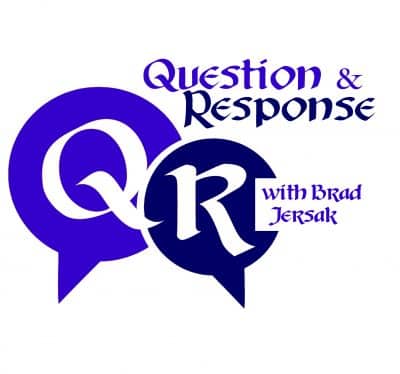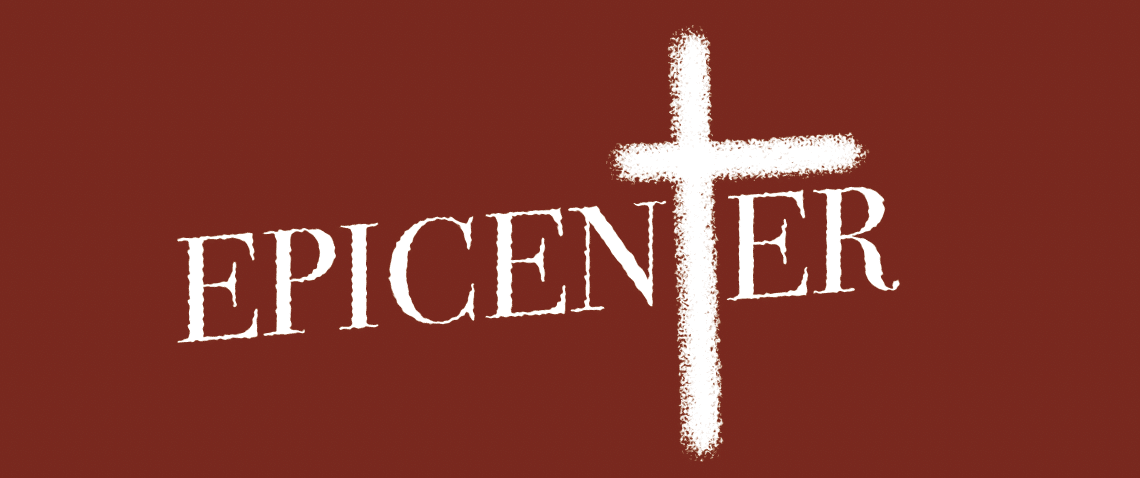Q & R: Friendly Pushback on Baptism – Brad Jersak
Question

Hi, Brad!
Love your work!
I just read “Baptism and the fate of the unprepared.” Overall a great message. I did want to push back slightly on your point of “why not?” Here’s my push back:
I once knew someone who waited decades (plural) to get baptized. His hangup for so long was that he would be alienating his very religious but non-Christian family – to the point of being disowned – if he were to be baptized. I wonder if the point (“a point”) of baptism was that it was meant to be a “low barrier” into the community of faith – i.e. Judaism required circumcision to join the community, but the Christian faith requires a little water. But what if that low barrier suddenly becomes a high barrier? Have we missed at least part of the point of baptism?
I get it. We’re supposed to choose Jesus over our tribal identities. I think this is different. My friend wasn’t avoiding his baptism to favor his tribal identity over Jesus. He was avoiding baptism to keep maintain relationships to both his tribe and his faith community.
Thoughts?
Response:
What an excellent and important question! Here’s my personal take:
I hear your point. This would be very dissimilar to first century actual experience, where baptism as a sign of saying “Yes” to Jesus was at times virtually a death warrant. That is, rather than a lower bar than circumcision, it became the ultimate threshold for taking up your cross.
I certainly understand the caution your friend had re: being disowned. The hard word from Christ about that is that he anticipated that dilemma and again, raised the bar: discipleship will require ‘hating father and mother’ — not a big ‘family values’ guy in that sense. In fact, Luke 9 is offers a brutal choice:
59 He said to another man, “Follow me.” But he replied, “Lord, first let me go and bury my father.” 60 Jesus said to him, “Let the dead bury their own dead, but you go and proclaim the kingdom of God.” 61 Still another said, “I will follow you, Lord; but first let me go back and say goodbye to my family.” 62 Jesus replied, “No one who puts a hand to the plow and looks back is fit for service in the kingdom of God.”
Luke 14:26 sounds even worse:
“If anyone comes to me and does not hate father and mother, wife andchildren, brothers and sisters—yes, even their own life—such a person cannot be my disciple.”
Of course Christ doesn’t mean that we should literally hate them. But because baptism is in part a sort of pledge of first allegiance to following Jesus and a citizenship ceremony of entry into the kingdom of Christ, it would not be (and still isn’t) uncommon for families to disown their own sons and daughters because they have raised family loyalty to the point of idolatry (as it obviously is if they issue a Jesus or our family ultimatum). In such cases, Christ doesn’t budge at all.
So where does Grace come in? I suppose it is Grace that calls us out of controlling family systems that function as religous institutions that see Christ as a competitor to the family hierarchy.
I also believe that Christ is infinitely patient and kind … it’s not that he rejects those who won’t be baptized or feel that their faith must remain secret. I recall the concession made to Naaman:
[Naaman]: “But may the Lord forgive your servant for this one thing: When my master enters the temple of Rimmon to bow down and he is leaning on my arm and I have to bow there also—when I bow down in the temple of Rimmon, may the Lordforgive your servant for this.”
“Go in peace,” Elisha said. (2 Kings 5:18-19).
On a grand scale, we have the example of the underground / persecuted church around the world and through the centuries. Again, baptism was simply a given as the Christ-prescribed “Yes” to Jesus BUT while ‘public’ (confession before fellow believers), these baptisms were normally ‘private’ in that they remained in-house. In other words, no one who wanted to follow Christ was exempt from baptism BUT neither were they required to make it public or tell family members.
For example, the Communist Czechoslovakia, my relatives were baptized in the underground church down at the river. Only fellow Christ-followers were informed and invited with the one risk that Christ also foresaw: the possibility that brother would betray brother (i.e. family members who found out might hand them over to the Communists). Strangely to us, they not only risked persecution and reprisals, it was not at all uncommon for them to cut a hole in the ice to receive baptism if the weather demanded it.
At the same time, from ancient times, concessions were made to make baptism possible for all. The Didache (also known as The Lord’s Teaching Through the Twelve Apostles to the Nations) was an early Christian manual for churches and baptismal candidates, written in the first century. It was even seriously considered for inclusion in the New Testament. It says this regarding baptism:
And concerning baptism, baptize this way: Having first said all these things, baptize into the name of the Father, and of the Son, and of the Holy Spirit, in living [running] water. But if you have no living water, baptize into other water; and if you cannot do so in cold water, do so in warm. But if you have neither, pour out water three times upon the head into the name of Father and Son and Holy Spirit. But before the baptism let the baptizer fast, and the baptized, and whoever else can; but you shall order the baptized to fast one or two days before.
In the end, if we’re faithful to Christ’s teaching in the Gospels (which is the real bar), the question of ‘counting the cost’ (Luke 14:25-33) rubs against the grain of ‘lowering the bar.’ Christ’s approach seems to be: “Follow me. But first, ask yourself. What costs more: following me or not following me?” In a secondary way, we could ask, “What costs more: an open and public faith or a private/secret faith?” Each has real ups and downs. But in either case, even a secret faith included baptism.
So again, when Jesus has said, “Here’s what you do if you want to follow me,” I’d ask why not be baptized, even if privately and in secret? Apparently he saw it as something important enough to him to command it.











 Plain Truth Ministries | Box 300 | Pasadena, CA 91129-0300
Plain Truth Ministries | Box 300 | Pasadena, CA 91129-0300

